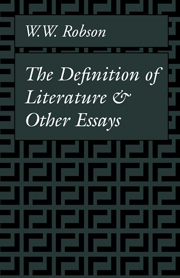Book contents
- Frontmatter
- Contents
- Preface
- Bibliographical note
- 1 The Definition of Literature
- 2 On Liberty of Interpreting
- 3 Evaluative Criticism, and Criticism without Evaluation
- 4 The Novel: a Critical Impasse?
- 5 The Sea Cook: a Study in the Art of Robert Louis Stevenson
- 6 On Kidnapped
- 7 On The Wind in the Willows
- 8 The Present Value of Tennyson
- 9 Robert Frost
- 10 Hopkins and Literary Criticism
- 11 T. S. Eliot: a Poet's Notebook
- 12 I. A. Richards
- 13 Yvor Winters: Counter-romantic
2 - On Liberty of Interpreting
Published online by Cambridge University Press: 01 June 2011
- Frontmatter
- Contents
- Preface
- Bibliographical note
- 1 The Definition of Literature
- 2 On Liberty of Interpreting
- 3 Evaluative Criticism, and Criticism without Evaluation
- 4 The Novel: a Critical Impasse?
- 5 The Sea Cook: a Study in the Art of Robert Louis Stevenson
- 6 On Kidnapped
- 7 On The Wind in the Willows
- 8 The Present Value of Tennyson
- 9 Robert Frost
- 10 Hopkins and Literary Criticism
- 11 T. S. Eliot: a Poet's Notebook
- 12 I. A. Richards
- 13 Yvor Winters: Counter-romantic
Summary
To understand the meaning of an utterance, is it necessary to know the intention of the utterer? (I use ‘utterer’ to cover both writers and speakers.) In order to get a preliminary grip on this question I shall distinguish three ingredients of meaning. First, there is who or what the utterance refers to. If someone says, ‘He made a great mistake in invading Russia’, we cannot fully understand this statement unless we know who ‘he’ is, unless we know the reference of the statement. We may guess that it probably refers to Hitler, or Napoleon, or Charles XII, but without the context the total meaning is uncertain. Next, there is what is said about the person or thing referred to; in this example, the mistake the subject made in invading Russia. This may be called the sense of the statement. And to understand this we have to be acquainted with a great many things. For instance, we have to know what sort of thing making a mistake is, or invasion. And of course in order to know that these notions are involved we have to know the relevant vocabulary and grammar in which the statement is made – in this case the English language. The necessary conditions for understanding the sense and reference of a statement are quite numerous and quite complex.
- Type
- Chapter
- Information
- The Definition of Literature and Other Essays , pp. 20 - 39Publisher: Cambridge University PressPrint publication year: 1982



